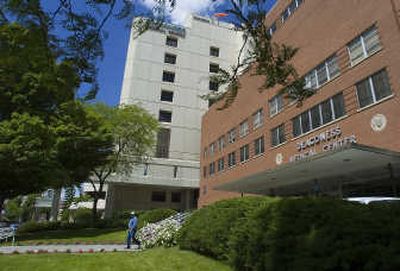Empire looks ahead

Community Health Systems Inc. has the money in place to buy Deaconess Medical Center and Valley Hospital and Medical Center.
With a collection of big-name banks lined up to offer the company credit, putting together a nine-figure deal has more to do gaining the approval of regulators and medical community, and less to do with finding the cash, said Ron McKay, chairman of Empire Health Services, which operates the two hospitals.
If successful, the sale of Empire will send waves through Eastern Washington health care and maybe provide a blueprint for other for-profit hospital chains seeking access to Pacific Northwest medical markets.
And yet for all the millions of dollars at stake, the purchase of Spokane’s Empire Health Services didn’t cause even a marketplace ripple for Community Health. The fact that Deaconess would be one Community’s largest hospitals, or that Community would own its first hospitals in the Pacific Northwest didn’t even generate a press release.
Community’s bid for Empire, frankly, has been lost amid its big-league takeover of rival Triad Hospitals Inc.
The letter of intent signed with Empire represents business as usual for Community Health, which has bought about 50 hospitals during this decade in smaller cities and towns and fixed many of them up – mostly in the Southeastern United States. The only mention of the deal by Community Health was a pre-recorded earnings announcement from April 25 when Wayne Smith, Community’s chief executive officer, talked of pending deals with hospitals in Spokane and Valparaiso, Ind.
Community won’t answer questions about its $6.8 billion cash and debt Triad takeover. And it doesn’t comment on pending hospital buys until definitive agreements are reached, according to a spokeswoman.
The Empire deal, though, fits nicely into Community’s strategy of adding hospitals, typically those with cash struggles and remodeling needs. In most cases, these hospitals are the only ones in town and run by nonprofit agencies, religious affiliations or government health districts.
Across the country, according to a recent financial report, Community Health has identified about 400 of these “acquisition opportunities.”
The deal with Triad is a sweeping departure from this strategy. Community’s offer scuttled a previous $6.4 billion buyout effort for Triad by CCPM Capital and FS Capital Partners. By upping the offer by $400, Community all but assured it would own Plano, Texas-based Triad, which competes with other hospital systems and has operations in cities.
Triad was founded as a spin-off from HCA in 1999, the for-profit hospital giant that was bought out by private investors last summer for $33 billion.
So what does this all mean for Empire? If a definitive agreement is reached – likely by the end of summer, said Empire Spokeswoman Becky Swanson – Empire will become part of the nation’s largest hospital firm traded on the Wall Street.
It will be among 130 or so hospitals in 28 states expected to pull in profits to satisfy stockholders including giant mutual funds runs by Fidelity Investments and T. Rowe Price for example, and investment bankers such as Credit Suisse and Deutsche Bank. Big institutional investors hold 95 percent of Community’s outstanding shares. Insiders including CEO Smith own less than 1 percent.
The demands from these major investors will be extraordinary.
In 2006 Community earned a $168 million profit on revenues of $4.3 billion.
It does not offer dividends, instead using its money to grow the company.
A Morningstar analyst’s report, published in April and not yet updated, concluded that Community was paying too much for Triad and would be too highly leveraged.
Community, a new member of the Fortune 500, has since borrowed $3.1 billion dollars to help finance its Triad takeover. While some analysts are skeptical, others have crunched the numbers, built the Triad purchase into Community’s share price and moved on to the next big deal.
To make money, Community flexes its buying power with medical and pharmaceutical vendors, consolidates management and overhead costs, and uses its size to squeeze better contract deals with insurers and reimbursements from government-run Medicaid for the poor and Medicare for the elderly.
It combines this with financial discipline and a growing balance sheet with valuable assets.
McKay ticked off a list of benefits for Spokane he hopes will be enough to earn the nod from regulators to sell nonprofit Empire to Community Health.
First, he said, would be hospital upgrades costing about $100 million. This would likely happen over several years; however nothing is final until a deal is done.
Second is the establishment of what McKay predicted would be the largest philanthropic foundation in the region as money from the sale leftover after paying off debts is invested into a new nonprofit.
Another strength is the recruitment of doctors to Spokane. During the first three months of the year, Community reported that it brought 156 new doctors to the cities where it owns hospitals.
Triad, according to McKay, has a reputation of working closely with doctors in competitive markets to ensure a stream of patients.
Community is known for keeping a lid on costs and admitting more patients by reorganizing or remodeling emergency rooms, where more than 60 percent of all hospital admissions originate.
Like other hospitals, Community has been beset by rising costs for charity care and bad debts from uninsured patients. Consider the problem: the U.S. Census Bureau indicates that in 2005, 44.8 million Americans, or 15.3 percent of the population, didn’t have health insurance.
By absorbing Triad, Community will also own hospitals in Oregon and Alaska, making Empire part of a new regional corporate hub.